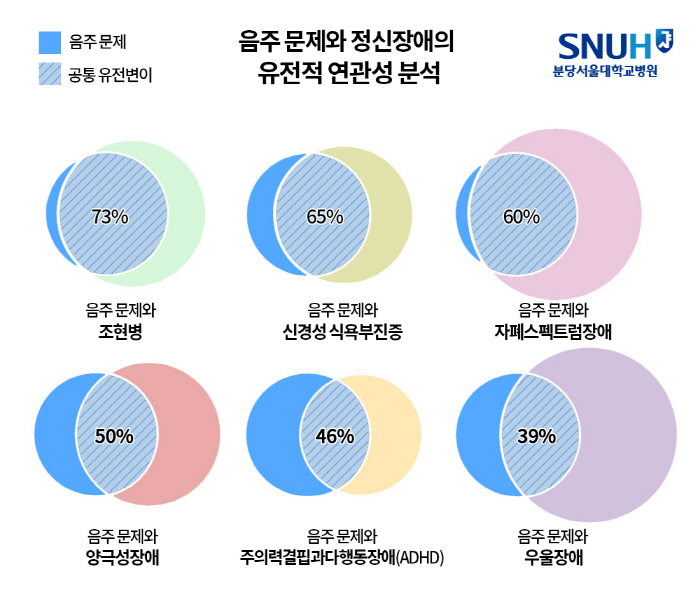Drinking problems and mental disorders, sharing the same genes...Expectations for Customized Treatment Development
|
The study was conducted by Professor Won Hong-hee of Sungkyunkwan University's Samsung Convergence Medical School/Samsung Seoul Hospital, researcher Ahn Ye-eun, and clinical instructor Kim Jae-hyun of the Department of Mental Health Medicine at Seoul National University Hospital.
Drinking problems such as alcohol dependence and binge drinking go beyond simple alcohol consumption, ▲ loss of control ▲ social and professional function deterioration ▲ physical and psychological damage, but drinking is repeated to the extent that it cannot be controlled by itself.
In particular, it is known to appear with various mental disorders such as schizophrenia and depressive disorder and further worsen the clinical course of these mental disorders. In addition, although genetic relationships between drinking problems and mental disorders have been raised through various studies, there has been a limit to identifying the exact genetic variation to determine the relationship.
In response, the research team precisely analyzed the common genetic structure and causative genes between drinking problems and mental disorders using 'massive full-length genome association analysis (GWAS)' of 430,000 multi-race people. GWAS is an analytical technique that investigates genetic mutations throughout a person's genome and finds genes related to behavioral characteristics (drinking, smoking, etc.) or specific diseases (such as schizophrenia, depressive disorder, etc.).
As a result of the study, drinking problems and mental disorders showed a high genetic association. Drinking problems shared 73% of common genetic mutations with schizophrenia, 65% with neurophagia, 60% with autism spectrum disorder, 50% with bipolar disorder, 46% with attention deficit hyperactivity disorder (ADHD), and 39% with depression disorder. This suggests that drinking problems and mental disorders can be expressed on a common genetic basis beyond just lifestyle or environmental factors.
In addition, the research team narrowed down gene candidates that can affect these two diseases in common based on strong genetic correlations, and found that genes 'TTC12' and 'ANKK1' are common causative genes. Both genes are factors that regulate the dopamine system and are closely related to brain functions such as impulse control and compensation systems. This provides important clues that can be the basis for targeted treatment for drinking problems or mental disorders beyond mere genetic associations.
Moreover, the findings are also significant in that they presented a new direction for precision medical-based customized treatment strategies by presenting scientific evidence that drinking problems and mental disorders can be genetically connected rather than independent problems.
Myung Woo-jae, a professor of psychiatry at Seoul National University Bundang Hospital, said, `Many mentally disabled patients choose to drink to relieve their mental pain, but their symptoms often worsen.' `This study is significant in the fact that it presents a new mechanism for treatment for patients suffering from both drinking problems and mental disorders.'
Professor Won Hong-hee of Samsung Medical Center said "This study used large-scale genomic analysis data and the latest statistical techniques to specifically investigate the genetic relationship between complex diseases."This research direction will not only analyze the genetic association between various diseases in depth, but also contribute to the development of optimal treatments considering these relationships."
Meanwhile, the study was published in the SCI (E) international journal 'American Journal of Psychiatry (IF. 15.1).
|
This article was translated by Naver AI translator.





